[ad_1]
Every morning, Paola Arbolera loads a few crates of smoked shark and stingray on to her wooden canoe and drags it to the river. Before the sun rises, she rows in darkness to the market in Guapi, a small fishing town on Colombia’s Pacific coast, to sell her goods.
She leaves her canoe under the rafters of the dock’s large loading bay, wedged between rubbish and other canoes, while fellow vendors unload bananas and plantain.

At about 5am, Arbolera, a 35-year-old single mother of seven, sets up shop on a street corner, displaying her home-smoked fish. The sunrise brings a flurry of activity, and the market comes to life. A swarm of straw hats and elderly shoppers bustle around Arbolera’s simple stand, where she sells her produce until about midday to provide a meagre livelihood for her children.
But doing this now makes Arbolera a criminal.
In November 2020, the government of former president Iván Duque issued a decree banning shark fishing and its commercialisation in the hope of tackling shark-fin exports and protecting marine life.

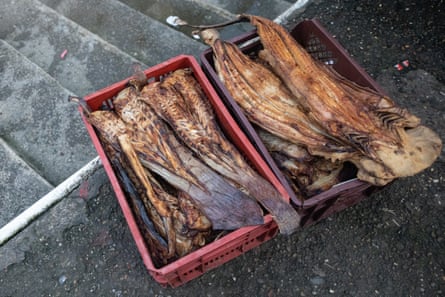
Arbolera relies solely on sales at the market for her income. She is illiterate, which drastically limits her few opportunities in the small town in Cauca, one of Colombia’s poorest provinces.
“What else can I do?” Arbolera says. “It’s our destiny to keep working. If we can’t do this, how will we feed our children?”
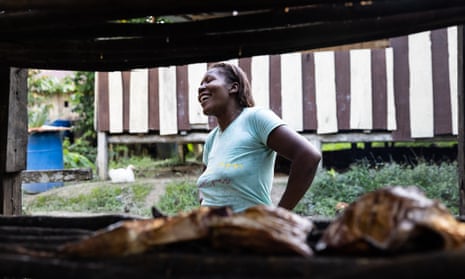


Both industrial and small-scale shark fishing have been banned in Colombia since 2017, but the new decree introduced a blanket ban that criminalises artisanal fishing as well, which local people such as Arbolera depend on.
“The decision marks a milestone in environmental public policy,” says Estefanía Rodríguez, a political advocacy adviser at MarViva, a marine conservation group. “The ban contributes positively to the health of marine ecosystems, the sustainability of shark populations and to the livelihood of coastal communities.”

Although the decree was celebrated by environmentalists, it has put the livelihoods of many fishing communities on the line.
As governments across the globe have scrambled to demonstrate their environmental credentials, Duque’s was no exception. His decree represents a clash between the preservation of Colombia’s marine ecosystems and the defence of its marginalised communities and their traditions.

The decree, introduced in March 2021, has jeopardised the wider supply chain and livelihoods of those who depend on it – from artisanal fishers and vendors, to cooks and families whose nutrition revolves around sharks.
Critics of the former president claim the decree was a way to secure an easy environmental win to improve his deeply unpopular image in the country. They say it has added an unnecessary layer of difficulty to an already challenging way of life among coastal communities.
“They made some of Colombia’s poorest communities suffer. They became illegal from one day to the next on a government’s whim,” says Diego Andrés Triana, a lawyer and adviser to the Association of Colombian Fishermen.
“The Black communities that live along the Pacific are the poorest of the poor. They are the nobodies of the fishing sector,” Triana says.
For towns such as Guapi, artisanal shark fishing is a longstanding traditional practice. Tollo – as the shark is known – provides regular sustenance for many families and holds significant cultural value among African-Colombian communities.



Maria Perlaza (top) prepares the traditional fish dish ceviche de tollo, served with rice and fried plantain, together with María Grueso (bottom right)
The small shark is found extensively along Colombia’s Pacific coast and typically grows to about 1.5 metres (5ft) long. It is often the cheapest form of protein many coastal communities have access to and the culinary staple is enjoyed either smoked, stewed, fried or in a traditional ceviche.
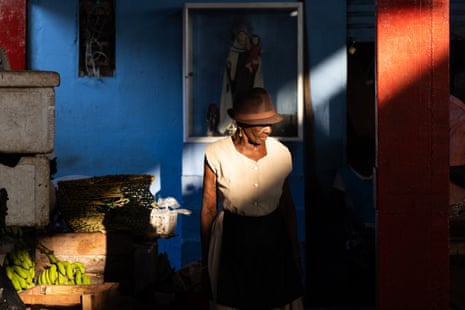
“Not having tollo in Guapi is like not having water in a desert. It’s important because it’s something cultural,” says Willingtong Obregón, who has been fishing for decades.
Artisanal fishers spend a few days at sea plying their trade before returning with their catch. They predominantly fish from small boats or canoes, lowering thin nets into the water to catch anything they find.



“[The ban] really affects us economically as it’s work through which we could easily provide for our families. It has a serious impact on the family subsistence of us Guapireños,” says Obregón, as he stands in the town market, flanked by women chopping up freshly caught fish.
Organisations and local people in Guapi claim the fishing community was not properly consulted about the decree or involved in discussions before its implementation.
Melba Angulo has been selling fish at Guapi market since the age of 10. “I’m aware that it affects the ecosystem, but to ban it they should have consulted us, who sell and fish it, to see what alternatives they could propose [for us] to sustain ourselves, because banning it ignores the families who live from this,” he says.
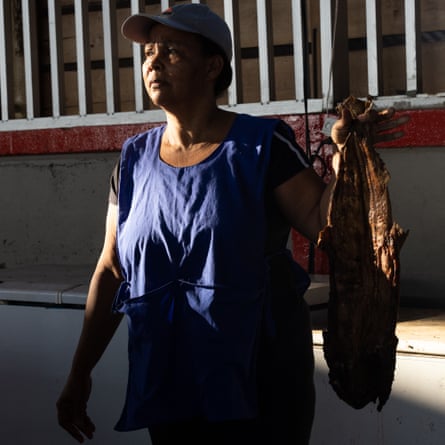
Melba Angulo, who has her own fish stall in Guapi market square, has been selling fish since she was a child
Colombia’s new vice-minister for the environment, Sandra Vilardy, admits: “We recognise the decree was not adequately consulted.”
Local fishers along the Pacific coast do not target tollo but capture it largely by accident. Toss a large net along the coast and chances are you will catch tollo whether you want to or not.
“Tollo fishing is incidental, how can one avoid that?” says Otto Polanco Rengifo, a marine biologist and former director of the government’s National Authority of Aquaculture and Fishing. “The decree forces you to do the unavoidable. You cannot prohibit such a socioeconomically vulnerable population from doing what for decades and centuries has kept them alive.”
Last year, as artisanal fisher Francisco “Pancho” Mina was returning to Guapi from several days at sea, he was stopped by the Colombian navy, which searched his boat for any illegal catch. Among the usual catfish and groupers, the authorities found 58 tollo sharks. They were confiscated by the authorities, who warned of more serious consequences if it happened again.
Like Obregón and Arbolera, Mina claims to have little choice but to continue with his work, regardless of what the decree may say. During the high season, Mina says he can catch up to 150 tollo sharks.

“It’s pure necessity because we don’t have anything else to do. [The authorities] shouldn’t persecute a working peasant if we’re just trying to feed our families,” he says.
Vilardy points out that the decree is meant to allow for incidental subsistence fishing, which raises questions about what happened to Mina.
“There is a possibility for that incidental fishing to be used in a local context because we recognise that it has a traditional use, which is very local and closely linked to traditional consumption and culture,” Vilardy told the Guardian.
Last month, the navy intercepted 904kg of illegally caught sharks onboard an industrial fishing boat off the coast of Bahía Solano, along the northern Pacific coast. They found 114 sharks – among them tollo – and 89 shark fins; 85% of the sharks were juveniles and below the minimum age to be caught.

Artisanal fishers also have to compete with industrial-scale fishing boats to protect their income. Uber Vasesilla, a 71-year-old captain of an industrial vessel, roams the coasts for days on end, sweeping the ocean for all kinds of fish.
After hours of trawling, his catch contains all sorts of marine life including eels, red snapper, stingrays, parrot fish, various crabs and puffer fish, but there is no sign of the popular shark.


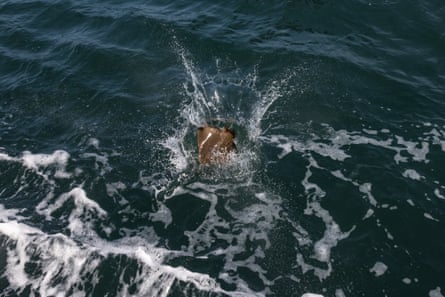
Fishers cut up fresh fish and prepare it for refrigeration while seabirds wheel in the air, waiting for the leftovers thrown into the sea (bottom right). Wilfrido Hurtado, 65, and Harold Bermúdez, 27, watch football on TV while they wait for the fishing nets to come up
“There’s not much tollo out there these days,” Vasesilla says, as he calmly steers his rusty ship with his foot. Either way, he and his ageing crew of six return any unwanted tollo and stingrays to the sea, as required by the decree.
So far this year, the Colombian navy has seized 7.4 tonnes of banned species.
On assuming power this year, the new leftwing government promised a broad slate of environmental policies and vowed to protect the interests and cultural traditions of marginalised African-Colombian communities.
The administration is now tasked with implementing its green agenda as well as finding a way to manage the decree while supporting the livelihoods of rural African-Colombians affected by it.
Vilardy says the ministry is reviewing the decree. “The plan is to work with the communities and assess possible improvements to the decree … for us to make adjustments based on a good mechanism of participation. It is very valuable for us to be able to keep cultures alive,” she says.

In the meantime, the fishers and vendors of Guapi have no option but to defy the decree and continue working on the fringes of legality to safeguard their livelihoods.
For Mina, the choice is simple: “If we live off this, then we’ll have to continue fishing.”

[ad_2]
#illegal #overnight #Colombias #shark #fishing #ban #turns #locals #criminals
( With inputs from : www.theguardian.com )